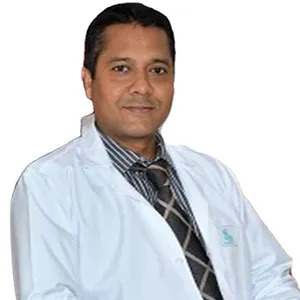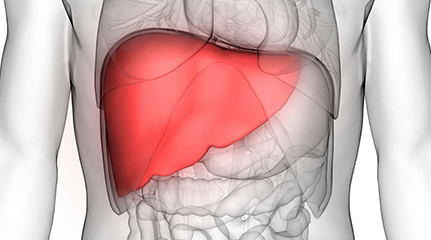




Department: Gastroenterology
Estimated Cost : $30,000 - $50,000
Liver diseases can vary in severity, from mild liver inflammation to serious conditions such as cirrhosis, liver failure, and liver cancer. The liver is one of the body's most vital organs, responsible for filtering toxins, regulating metabolism, and producing proteins essential for bodily functions. When the liver is damaged, it can severely impact your overall health. Early detection and appropriate treatment are crucial to managing liver diseases and preventing further complications.
At Healtour Solutions, we connect patients with world-class hospitals and specialists in India, offering comprehensive liver disease management and treatment options. This guide delves into the types of liver diseases, available treatment options, and how Healtour Solutions facilitates affordable and effective treatment for liver conditions.
Liver diseases are categorized based on their cause and the severity of the liver damage. Some of the most common types of liver diseases include:
1. Hepatitis (A, B, C, D, E):
Hepatitis refers to the inflammation of the liver caused by viral infections. Hepatitis B and C are the most common and can lead to chronic liver disease. Hepatitis can be acute (short-term) or chronic (long-term), and without treatment, chronic hepatitis can cause irreversible damage to the liver.
2. Fatty Liver Disease (NAFLD/NASH):
Non-Alcoholic Fatty Liver Disease (NAFLD) occurs when excess fat accumulates in the liver of people who consume little or no alcohol. This condition can progress to Non-Alcoholic Steatohepatitis (NASH), which involves inflammation and liver damage. Over time, NASH can lead to cirrhosis or liver cancer.
3. Cirrhosis:
Cirrhosis is the result of long-term liver damage, causing scar tissue to replace healthy liver tissue. Cirrhosis can be caused by chronic hepatitis, heavy alcohol consumption, or fatty liver disease. The condition impairs the liver’s ability to function and can eventually lead to liver failure.
4. Liver Cancer (Hepatocellular Carcinoma):
Liver cancer often develops in patients with chronic liver disease, such as cirrhosis or hepatitis. It occurs when abnormal liver cells begin to grow uncontrollably, forming tumors that can spread to other organs.
5. Liver Failure:
Liver failure refers to the inability of the liver to perform its essential functions. This condition can be caused by acute liver disease, such as viral hepatitis, or the progression of chronic liver diseases like cirrhosis. Liver failure is life-threatening and often requires a liver transplant for survival.
Symptoms of liver disease can be subtle in the early stages, but they worsen as the condition progresses. Some common symptoms include:
If you experience any of these symptoms, it’s essential to seek medical attention. Early detection and treatment can significantly improve outcomes and prevent serious liver damage.
Liver diseases can be caused by a variety of factors, including:
Liver disease is diagnosed using a combination of blood tests, imaging techniques, and sometimes a liver biopsy. Some common diagnostic tools include:
The treatment for liver disease depends on the specific condition, its severity, and the patient’s overall health. The following are common treatment options:
1. Medications:
Depending on the type of liver disease, medications are prescribed to manage the condition and prevent further damage:
2. Lifestyle Changes:
Along with medications, adopting a liver-friendly lifestyle is crucial in managing liver disease:
3. Liver Transplant:
In cases of advanced cirrhosis, liver failure, or liver cancer, a liver transplant may be required. A liver transplant involves replacing the diseased liver with a healthy donor liver. The procedure can be life-saving for patients whose livers can no longer function properly.
4. Liver Cancer Treatment:
Liver cancer treatment depends on the stage of the cancer. Treatment options include:
5. Management of Complications:
Liver disease can lead to complications like ascites (fluid buildup), varices (enlarged veins in the stomach), and hepatic encephalopathy (confusion due to liver failure). These conditions are treated with medications, dietary changes, and procedures such as fluid drainage or variceal banding.
Don't wait for symptoms to worsen. Contact Healtour Solutions now for expert care, personalized treatment plans, and affordable liver disease management. Our team is here to guide you every step of the way.
Reach out today and start your journey to better liver health!
1. What are the common causes of liver disease?
Liver diseases can be caused by viral infections (like Hepatitis B and C), excessive alcohol consumption, non-alcoholic fatty liver disease (NAFLD), obesity, genetic conditions (e.g., hemochromatosis, Wilson’s disease), and exposure to toxins or medications.
2. What are the symptoms of liver disease?
Common symptoms include fatigue, jaundice (yellowing of the skin and eyes), abdominal pain, dark urine, pale stool, nausea, loss of appetite, and swelling in the legs and abdomen.
3. How is liver disease diagnosed?
Liver disease is diagnosed through blood tests (liver function tests), imaging scans like ultrasound or CT scans, liver biopsy, and sometimes viral load tests for Hepatitis B or C.
4. What are the treatment options for liver disease?
Treatment depends on the type and severity of the liver disease. Options include antiviral medications for Hepatitis, lifestyle changes, medications for fatty liver disease, surgery for liver cancer, and liver transplant in cases of advanced liver failure.
5. What is the role of lifestyle changes in managing liver disease?
Lifestyle changes play a significant role in managing liver disease. These include avoiding alcohol, maintaining a healthy weight, eating a balanced diet, staying active, and avoiding exposure to harmful chemicals and toxins.
6. What is the cost of liver disease treatment in India?
Treatment costs can vary widely depending on the type of liver disease and the required treatment. For example, a liver transplant can cost between $30,000 and $50,000, while medications and diagnostic tests typically range from $30 to $500.
7. Can fatty liver disease be cured?
While there is no specific cure for fatty liver disease, lifestyle changes such as weight loss, diet modifications, and exercise can significantly reduce fat accumulation and prevent progression to more serious liver conditions.
8. When is a liver transplant required?
A liver transplant may be required in cases of advanced cirrhosis, liver failure, or liver cancer when the liver is no longer able to function properly.
9. Is it possible to prevent liver disease?
Prevention strategies include vaccination for Hepatitis B, maintaining a healthy diet, avoiding excessive alcohol intake, exercising regularly, and avoiding exposure to harmful chemicals. Regular check-ups and early detection are also key in preventing liver disease progression.
10. How does Healtour Solutions help patients with liver disease?
Healtour Solutions connects patients with top hospitals and liver specialists in India, offering personalized care, treatment coordination, travel support, and affordable options for liver disease management and liver transplant services.
@2025 Healtour Solutions Pvt Ltd. All Rights Reserved.